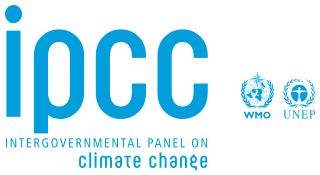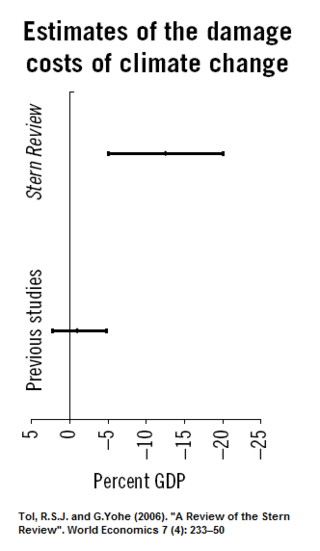
The Intergovernmental Panel on Climate Change (IPCC) is an intergovernmental body of the United Nations. Its job is to advance scientific knowledge about climate change caused by human activities. The World Meteorological Organization (WMO) and the United Nations Environment Programme (UNEP) established the IPCC in 1988. The United Nations endorsed the creation of the IPCC later that year. It has a secretariat in Geneva, Switzerland, hosted by the WMO. It has 195 member states who govern the IPCC. The member states elect a bureau of scientists to serve through an assessment cycle. A cycle is usually six to seven years. The bureau selects experts to prepare IPCC reports. It draws the experts from nominations by governments and observer organizations. The IPCC has three working groups and a task force, which carry out its scientific work.

There is a strong scientific consensus that the Earth is warming and that this warming is mainly caused by human activities. This consensus is supported by various studies of scientists' opinions and by position statements of scientific organizations, many of which explicitly agree with the Intergovernmental Panel on Climate Change (IPCC) synthesis reports.

Climate change affects the physical environment, ecosystems and human societies. Changes in the climate system include an overall warming trend, more extreme weather and rising sea levels. These in turn impact nature and wildlife, as well as human settlements and societies. The effects of human-caused climate change are broad and far-reaching. This is especially so if there is no significant climate action. Experts sometimes describe the projected and observed negative impacts of climate change as the climate crisis.
Myles Robert Allen is an English climate scientist. He is Professor of Geosystem Science in the University of Oxford's School of Geography and the Environment, and in the Atmospheric, Oceanic and Planetary Physics Department.

The economic analysis of climate change explains how economic thinking, tools and techniques are applied to calculate the magnitude and distribution of damage caused by climate change. It also informs the policies and approaches for mitigation and adaptation to climate change from global to household scales. This topic is also inclusive of alternative economic approaches, including ecological economics and degrowth. In a cost–benefit analysis, the trade offs between climate change impacts, adaptation, and mitigation are made explicit. Cost–benefit analyses of climate change are produced using integrated assessment models (IAMs), which incorporate aspects of the natural, social, and economic sciences. The total economic impacts from climate change are difficult to estimate, but increase for higher temperature changes.
Climate Change 2007, the Fourth Assessment Report (AR4) of the United Nations Intergovernmental Panel on Climate Change (IPCC), was published in 2007 and is the fourth in a series of reports intended to assess scientific, technical and socio-economic information concerning climate change, its potential effects, and options for adaptation and mitigation. The report is the largest and most detailed summary of the climate change situation ever undertaken, produced by thousands of authors, editors, and reviewers from dozens of countries, citing over 6,000 peer-reviewed scientific studies. People from over 130 countries contributed to the IPCC Fourth Assessment Report, which took six years to produce. Contributors to AR4 included more than 2,500 scientific expert reviewers, more than 800 contributing authors, and more than 450 lead authors.

The IPCC Fourth Assessment Report (AR4) is a report on climate change created with the help of a large number of contributors, both scientists and governmental representatives. There has been considerable political controversy over a small number of errors found in the report, and there have been calls for review of the process used to formulate the report. The overwhelming majority view of scientists with expertise in climate change is that errors, when found, are corrected, and the issues as identified do not undermine the conclusions of the report that the climate system is warming in response to increased levels of greenhouse gases, largely due to human activities.
The Burtoni Award was created in 2003 by a group of leading experts and policy makers in the field of climate change. It is named for the Canadian science pioneer Ian Burton. Its purpose is to recognize outstanding contributions to the science of adaptation to climate change. The award is named after the first recipient of the award, Ian Burton, an emeritus professor at the University of Toronto and a pioneer in the field of adaptation to climate change and extreme events and disasters. Ian has contributed to three assessment reports of the IPCC and the recent Special Report on Extremes (SREX).

The Fifth Assessment Report (AR5) of the United Nations Intergovernmental Panel on Climate Change (IPCC) is the fifth in a series of such reports and was completed in 2014. As had been the case in the past, the outline of the AR5 was developed through a scoping process which involved climate change experts from all relevant disciplines and users of IPCC reports, in particular representatives from governments. Governments and organizations involved in the Fourth Report were asked to submit comments and observations in writing with the submissions analysed by the panel. Projections in AR5 are based on "Representative Concentration Pathways" (RCPs). The RCPs are consistent with a wide range of possible changes in future anthropogenic greenhouse gas emissions. Projected changes in global mean surface temperature and sea level are given in the main RCP article.

Climate change and poverty are deeply intertwined because climate change disproportionally affects poor people in low-income communities and developing countries around the world. The impoverished have a higher chance of experiencing the ill-effects of climate change due to the increased exposure and vulnerability. Vulnerability represents the degree to which a system is susceptible to, or unable to cope with, adverse effects of climate change including climate variability and extremes.

In earth science, global surface temperature is calculated by averaging the temperatures over sea and land.

The contributions of women in climate change have received increasing attention in the early 21st century. Feedback from women and the issues faced by women have been described as "imperative" by the United Nations and "critical" by the Population Reference Bureau. A report by the World Health Organization concluded that incorporating gender-based analysis would "provide more effective climate change mitigation and adaptation."

Fatima Denton is a British-Gambian climatologist. She is the director at the Ghanaian branch of the United Nations University, at the UNU Institute for Natural Resources in Africa (UNU-INRA) in Accra. She focuses on innovation, science, technology and natural resource management. She partners with countries such as Benin and Liberia to develop and implement country needs assessment missions.

The United Nations' Intergovernmental Panel on Climate Change's (IPCC) Special Report on Climate Change and Land (SRCCL), also known as the "Special Report on climate change, desertification, land degradation, sustainable land management, food security, and greenhouse gas fluxes in terrestrial ecosystems", is a landmark study from 2019 by 107 experts from 52 countries. The SRCCL provides a comprehensive overview of the entire land-climate system for the first time and decided to enlist land as a "critical resource". The IPCC's 50th session (IPCC-50) formally adopted the SRCCL's Summary for policymakers (SPM) and approved the underlying report. The SPM and the full text of Special Report on Climate Change and Land—in an unedited form—were released on 8 August 2019. The report is over 1,300 pages long and includes the work of 107 experts from 52 countries.

Katherine Calvin is NASA's Chief Scientist and Senior Climate Advisor. In July 2023, she was elected co-chair of the Intergovernmental Panel on Climate Change (IPCC) Working Group III. As an earth scientist at the Joint Global Change Research Institute (JGCRI), she has researched human use of global resources using Earth modeling systems at JGCRI under the direction of Pacific Northwest National Laboratory (PNNL) and the University of Maryland. She has contributed to the third US National Climate Assessment as well as two special reports by the Intergovernmental Panel on Climate Change (IPCC).

A marine heatwave is a period of abnormally high ocean temperatures relative to the average seasonal temperature in a particular marine region. Marine heatwaves are caused by a variety of factors, including shorter term weather phenomena such as fronts, intraseasonal, annual, or decadal modes like El Niño events, and longer term changes like climate change. Marine heatwaves can have biological impacts on ecosystems at individual, population, and community levels. MHWs have led to severe biodiversity changes such as coral bleaching, sea star wasting disease, harmful algal blooms, and mass mortality of benthic communities. Unlike heatwaves on land, marine heatwaves can extend for millions of square kilometers, persist for weeks to months or even years, and occur at subsurface levels.

Sustainable Development Goal 13 is to limit and adapt to climate change. It is one of 17 Sustainable Development Goals established by the United Nations General Assembly in 2015. The official mission statement of this goal is to "Take urgent action to combat climate change and its impacts". SDG 13 and SDG 7 on clean energy are closely related and complementary.

The Sixth Assessment Report (AR6) of the United Nations (UN) Intergovernmental Panel on Climate Change (IPCC) is the sixth in a series of reports which assess scientific, technical, and socio-economic information concerning climate change. Three Working Groups covered the following topics: The Physical Science Basis (WGI); Impacts, Adaptation and Vulnerability (WGII); Mitigation of Climate Change (WGIII). Of these, the first study was published in 2021, the second report February 2022, and the third in April 2022. The final synthesis report was finished in March 2023.

Climate change vulnerability is a concept that describes how strongly people or ecosystems are likely to be affected by climate change. It is defined as the "propensity or predisposition to be adversely affected" by climate change. It can apply to humans and also to natural systems. Related concepts include climate sensitivity and the ability, or lack thereof, to cope and adapt. Vulnerability is a component of climate risk. Vulnerability differs within communities and across societies, regions, and countries, and can increase or decrease over time.
Joyashree Roy is an Indian economist with specialization in the fields of Environmental economics, energy economics and Climate change mitigation.













